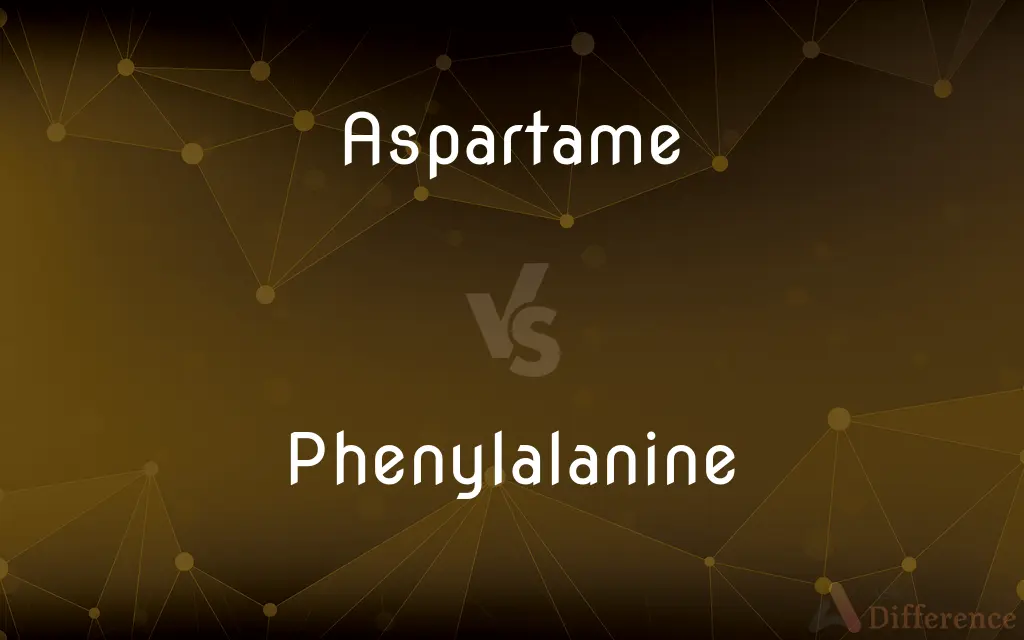Aspartame vs. Phenylalanine — What's the Difference?
By Tayyaba Rehman & Fiza Rafique — Updated on March 5, 2024
Aspartame is an artificial sweetener used in many low-calorie foods, while phenylalanine is an essential amino acid found naturally in protein-rich foods and also a component of aspartame.

Difference Between Aspartame and Phenylalanine
Table of Contents
ADVERTISEMENT
Key Differences
Aspartame is a widely used artificial sweetener, known for its ability to provide a sweet taste without the high calorie count associated with sugar. It is a compound that, upon ingestion, breaks down into several chemical byproducts, including phenylalanine, aspartic acid, and methanol. Phenylalanine, on the other hand, is an essential amino acid, meaning it cannot be synthesized by the human body and must be obtained through diet. It is crucial for the synthesis of proteins and various neurotransmitters and hormones, including dopamine and norepinephrine.
Aspartame is commonly found in diet sodas, sugar-free gum, and low-calorie dessert options. Its use allows individuals looking to control calorie intake or manage diabetes to enjoy sweet foods without the associated sugar content. Phenylalanine is found in high-protein foods such as meat, fish, eggs, dairy products, and some nuts and seeds. For most people, the consumption of phenylalanine poses no health risk and is an important part of a balanced diet.
Individuals with a rare genetic disorder known as phenylketonuria (PKU) must avoid phenylalanine, including foods containing aspartame, as their bodies are unable to metabolize this amino acid properly. This can lead to dangerous levels of phenylalanine in the brain, causing intellectual disabilities and other serious health problems. Products containing aspartame are required to carry a warning label for people with PKU.
While aspartame and phenylalanine are chemically related, with the latter being a breakdown product of the former, their roles and implications for health are significantly different. Aspartame serves primarily as a sugar substitute to reduce calorie intake and manage sugar levels, whereas phenylalanine is a dietary necessity for protein synthesis and neurotransmitter production, with specific dietary restrictions applying only to individuals with PKU.
Comparison Chart
Nature
Artificial sweetener
Essential amino acid
ADVERTISEMENT
Source
Synthetically produced
Found in protein-rich foods and as a component of aspartame
Primary Use
Sugar substitute in low-calorie and diet foods
Protein synthesis, neurotransmitter production
Health Implications
Generally safe for most people, but must be avoided by individuals with PKU
Essential for health, but individuals with PKU must limit intake
Breakdown Products
Breaks down into phenylalanine, aspartic acid, and methanol
Not applicable, as it is a basic component
Dietary Source
Added to various foods and beverages
Meat, fish, eggs, dairy, some nuts, and seeds
PKU Considerations
Products containing aspartame must have a warning label for people with PKU
Strict dietary management required for individuals with PKU
Compare with Definitions
Aspartame
Breaks down into phenylalanine and other components.
Upon digestion, aspartame yields phenylalanine, necessitating PKU warnings on labels.
Phenylalanine
An essential amino acid found in protein-rich foods.
Phenylalanine is necessary for protein synthesis and is consumed through diet.
Aspartame
Suitable for diabetes management.
Aspartame allows individuals with diabetes to enjoy sweet tastes without affecting sugar.
Phenylalanine
Involved in neurotransmitter production.
The body uses phenylalanine to produce dopamine and norepinephrine.
Aspartame
A low-calorie artificial sweetener.
Aspartame is often used in diet sodas to reduce their calorie content.
Phenylalanine
Must be regulated in individuals with PKU.
People with PKU follow a diet low in phenylalanine to prevent health complications.
Aspartame
Used in sugar-free and diet products.
Sugar-free gum typically contains aspartame as a sweetening agent.
Phenylalanine
Found in meats, dairy, and some nuts.
High levels of phenylalanine are present in chicken, milk, and almonds.
Aspartame
Requires PKU warning labels.
Foods containing aspartame display warnings for those with phenylketonuria.
Phenylalanine
A component of aspartame.
When aspartame is metabolized, it releases phenylalanine as one of its breakdown products.
Aspartame
An artificial sweetener containing an aspartic acid peptide, (C14H18N2O5); it is 160 times sweeter than sucrose (cane sugar) and is used as a calorie-free sweetener. Chemically it is N-L-
Phenylalanine
Phenylalanine (symbol Phe or F) is an essential α-amino acid with the formula C9H11NO2. It can be viewed as a benzyl group substituted for the methyl group of alanine, or a phenyl group in place of a terminal hydrogen of alanine.
Aspartame
Aspartame is an artificial non-saccharide sweetener 200 times sweeter than sucrose, and is commonly used as a sugar substitute in foods and beverages. It is a methyl ester of the aspartic acid/phenylalanine dipeptide with the trade names NutraSweet, Equal, and Canderel.
Phenylalanine
An essential amino acid, C9H11NO2, that occurs as a constituent of many proteins and is converted to tyrosine in the body.
Aspartame
An artificial sweetener, C14H18N2O5, whose metabolic breakdown products include aspartic acid and phenylalanine. It must be avoided by people with phenylketonuria.
Phenylalanine
(amino acid) An essential amino acid C9H11NO2 found in most animal proteins; it is essential for growth; the inability to metabolize it leads to phenylketonuria; it is a constituent of aspartame.
Aspartame
(organic compound) An artificial sweetener, the methyl ester of a dipeptide formed from aspartic acid and phenylalanine, used in many processed foods and beverages.
Aspartame
An artificial sweetener made from aspartic acid; used as a calorie-free sweetener
Common Curiosities
What is aspartame?
Aspartame is an artificial sweetener used in many low-calorie and diet foods to provide sweetness without the added calories of sugar.
Can everyone safely consume aspartame and phenylalanine?
While most people can safely consume aspartame and phenylalanine, individuals with phenylketonuria (PKU) must avoid high intakes due to their inability to metabolize phenylalanine properly.
What is phenylalanine?
Phenylalanine is an essential amino acid required for protein synthesis and the production of certain neurotransmitters, obtained through diet.
Are there health risks associated with aspartame for people without PKU?
For the general population, aspartame is considered safe for consumption within the established acceptable daily intake levels.
What is phenylketonuria (PKU)?
Phenylketonuria (PKU) is a rare genetic disorder where the body cannot properly break down phenylalanine, leading to potentially harmful levels in the brain.
How is phenylalanine beneficial for the body?
Phenylalanine plays a key role in protein synthesis and the production of important molecules like neurotransmitters, which are essential for brain function and overall health.
Why do products containing aspartame carry a warning label?
Products contain a warning label to inform individuals with PKU that the product contains phenylalanine, which they must limit or avoid.
What foods are high in phenylalanine?
Foods high in phenylalanine include meat, fish, eggs, dairy products, and some nuts and seeds.
How are aspartame and phenylalanine related?
Phenylalanine is one of the breakdown products of aspartame when it is metabolized by the body.
How does the body use phenylalanine?
The body uses phenylalanine to synthesize proteins and neurotransmitters, such as dopamine and norepinephrine, which are vital for brain function and mood regulation.
Is aspartame suitable for people with diabetes?
Yes, aspartame can be a suitable sugar substitute for people with diabetes, allowing them to enjoy sweet foods without significantly affecting sugar levels.
How can individuals with PKU manage their condition?
Individuals with PKU manage their condition through a diet low in phenylalanine, avoiding foods and products high in this amino acid, including those containing aspartame.
What are the alternatives to aspartame for sweetening?
Alternatives to aspartame include other artificial sweeteners like sucralose and stevia, as well as natural sweeteners such as honey and agave, though these contain more calories.
Can aspartame cause cancer?
Research and regulatory agencies have found no conclusive evidence that aspartame at normal consumption levels is carcinogenic to humans.
Why is it important to regulate phenylalanine intake in PKU?
Regulating phenylalanine intake in individuals with PKU is crucial to prevent the accumulation of harmful levels in the brain, which can lead to intellectual disabilities and other serious health issues.
Share Your Discovery

Previous Comparison
Graphite vs. Lead
Next Comparison
Landlady vs. LandlordAuthor Spotlight
Written by
Tayyaba RehmanTayyaba Rehman is a distinguished writer, currently serving as a primary contributor to askdifference.com. As a researcher in semantics and etymology, Tayyaba's passion for the complexity of languages and their distinctions has found a perfect home on the platform. Tayyaba delves into the intricacies of language, distinguishing between commonly confused words and phrases, thereby providing clarity for readers worldwide.
Co-written by
Fiza RafiqueFiza Rafique is a skilled content writer at AskDifference.com, where she meticulously refines and enhances written pieces. Drawing from her vast editorial expertise, Fiza ensures clarity, accuracy, and precision in every article. Passionate about language, she continually seeks to elevate the quality of content for readers worldwide.















































